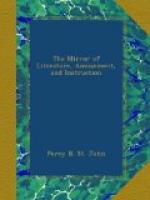(To be continued.)
* * * * *
THE GATHERER.
A snapper up of unconsidered trifles.
SHAKSPEARE.
* * * * *
PRISONS.
We had formerly in the Tower of London, a straight room or dungeon, called, from the misery the unhappy occupiers of this very confined place endured, the Little-Ease. But this will appear a luxurious habitation, when compared with the inventions of Louis XI. of France, with his iron cages, in which persons of rank lay for whole years; or his oubliettes, dungeons made in the form of reversed cones, with concealed trap-doors, down which dropped the unhappy victims of the tyrant, brought there by Tristam L’Hermite, his companion and executioner in ordinary; sometimes their sides were plain, sometimes set with knives, or sharp-edged wheels; but in either cases they were complete oubliettes; the devoted were certain to fall into the land where all things are forgotten.—(Pennant’s London.)
When the Bastille of France was demolished, three iron cages were discovered, they were made of strong bars of iron, about eight feet high and six feet wide, and such have been used in other prisons in that country. The Bishop of Verdun, according to Mezeray, was the inventer, and was himself the first man confined in them, and remained a prisoner thus for eleven years, so that he could speak practically as to his own invention.
* * * * *
FEMALE LEANDER.
The Duchess of Chevereux, who was for the first time at the court of England, in 1638, swam across the Thames, in a frolic, near Windsor. On this occasion some verses were composed by a Sir J. M. containing these lines:—
But her chaste breast, cold as the cloyster’d
nun,
Whose frost to chrystal might congeal
the sun,
So glar’d the stream, that pilots,
there afloat,
Thought they might safely land without
a boat;
July had seen the Thames in ice involv’d,
Had it not been by her own beams dissolv’d.
* * * * *
BIRTHDAY PRAYER.
The observance of a birthday by prayer is not altogether incurious in these days of license; and the following specimen, quoted from the Diary of that truly good man, JOHN EVELYN, may be entertained as the genuine effusion of piety, unmixed with any alloy of fanaticism, or religious enthusiasm:—




